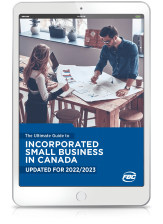Last updated: Nov. 22, 2023
As a business owner in Canada, you’ve likely faced the decision of how to pay yourself from your incorporated business. Two common options are paying yourself a salary or taking dividends, though some business owners choose a mix of both.
The method you use to pay yourself personally from your corporation has an impact on many different things—and not just your personal income tax owing.
While dividends likely create the lowest personal tax liability, they don’t allow you to create contribution room in your RRSP, build up Canada Pension Plan (CPP), or take advantage of childcare credits.
The form of your personal compensation can affect what you receive from government programs and credits as well as your ability to qualify for loans from lending institutions. Dividends aren’t accepted as reported personal income on loan applications, which may make it difficult to get approved for a mortgage or other line of non-business credit.
Let’s look at the differences between taking a salary and taking dividends, and what each option could mean for you when deciding how to structure your compensation.
Featured Resource: Ultimate Guide to Incorporated Small Business in Canada
Should I pay myself a business salary?
If you decide to pay yourself a salary, you’ll need to register a payroll account with the Canada Revenue Agency (CRA).
Each time you pay yourself, you’ll need to withhold and remit income taxes to the CRA. You’re also required to make mandatory payments to the CPP on your income.
If you’re a small business owner and your net income is more than $3,500, you will end up paying double the CPP than you would as an employee, as you are paying the employer’s half and the employee’s half; however, the employer portion is tax deductible.
Paying yourself a salary could be a good option if you are relying on CPP and RRSP as parts of your retirement savings, as your RRSP contribution room is built using your earned income through a business salary.
Your salary will be subject to Canada’s personal tax rates, which are generally higher than those paid by incorporated businesses, though you can claim your salary as a business expense, which will lower your business’ overall taxable income.
If you decide to collect a salary, your business will have to issue you a T4 “Statement of Remuneration Paid” slip showing the amount you need to report as income on your personal tax return. You may want to work with a payroll specialist to ensure you’re correctly calculating and submitting your required payroll source deductions.
Related: Should I use an RRSP or TFSA as a business owner?
Should I pay myself dividends?
Dividends are a portion of the company’s earnings that is paid to shareholders of the corporation.
When you take dividends in lieu of a salary, you won’t need to register for payroll and remit source deductions, including CPP and payroll taxes, if there are no payroll (salary) payments.
You might pay slightly less personal tax on dividends than on a salary, since you receive a dividend tax credit that you can help lower your overall personal tax owing.
It’s also important to note that dividends are considered investment income, not business income, so dividend payments do not lower the company’s taxable income.
When you distribute dividends to your shareholders, including yourself, you must submit a T5 to the CRA for each stakeholder who receives dividends.
Paying yourself dividends could be right for you if you don’t want forced CPP contributions or payroll taxes, but keep in mind that dividends do not build RRSP contribution room, so you’ll want to have your own retirement plan in place.
Taking out a Shareholder Loan
Although shareholder loans are not considered to be a method for paying yourself, they are a way to take money out of your corporation.
Shareholders may use corporate funds for personal uses throughout the year, though these amounts are considered loans from the corporation to the shareholder and must be repaid.
Shareholder loans won’t be included in your personal taxable income if you repay the loan within one year of the end of the corporation’s fiscal year. However, if the loan is not repaid within the allotted time frame, you must include the unpaid amount in your taxable income and pay income tax on it
Shareholder loans can be a great option for business owners, but they aren’t right for every situation. Learn more about shareholder loans, whether or not they’re right for you by visiting the links below or speaking to a tax specialist.
Related: Do shareholder loans count as taxable income?
What is a shareholder loan?
So how should I pay myself as a business owner?
How you take compensation from your business depends on several factors, including the health of the business, your family’s financial circumstances and income requirements, and your retirement income strategy.
Paying yourself a salary will provide a steady income and improve your chances of being approved for a loan, though you will pay more in taxes.
Dividends are a more flexible payment option, and you don’t have to pay into CPP, which will reduce your costs.
However, you’ll need to be diligent about contributing to your own retirement savings and understand that you won’t be creating contribution room in your RRSP by issuing yourself dividends.
There is no one-size-fits-all answer to whether you should pay yourself a salary or dividends, and in some cases the best choice is a combination of both. Speak to a tax specialist to learn which option is right for you.
Free Guide: Ultimate Guide to Incorporated Small Business in Canada
Many incorporated business owners feel intimidated by the demands of tax season and the corporate filing requirements of the Canada Revenue Agency (CRA). This is completely natural.
While there are numerous benefits to incorporation, it also comes with complex obligations. The complexity and administrative burden of these requirements leave many businesses struggling to keep up.
That’s why we’ve created “The Ultimate Guide to Incorporated Small Business in Canada”. Not only will it help you get organized for tax season, but it will help you make sense of your obligations under a corporate structure and to take advantage of the benefits!
Need more information?
With more than 70 years of Canadian tax experience, we offer unlimited corporate tax preparation help, support and tax advice for one flat fee. Our tax experts will run the numbers to create a custom T2 corporate tax return that helps minimize headaches and maximize your tax savings.
Leave your unique tax situation to us. We’ll get you every dollar you deserve.



